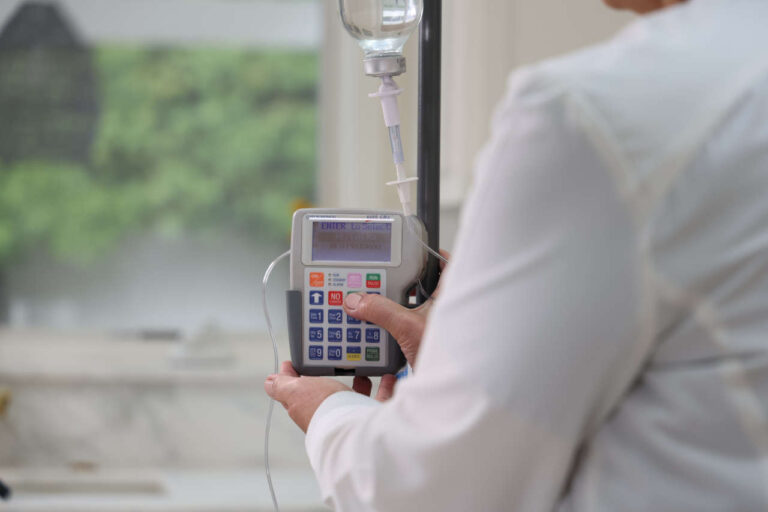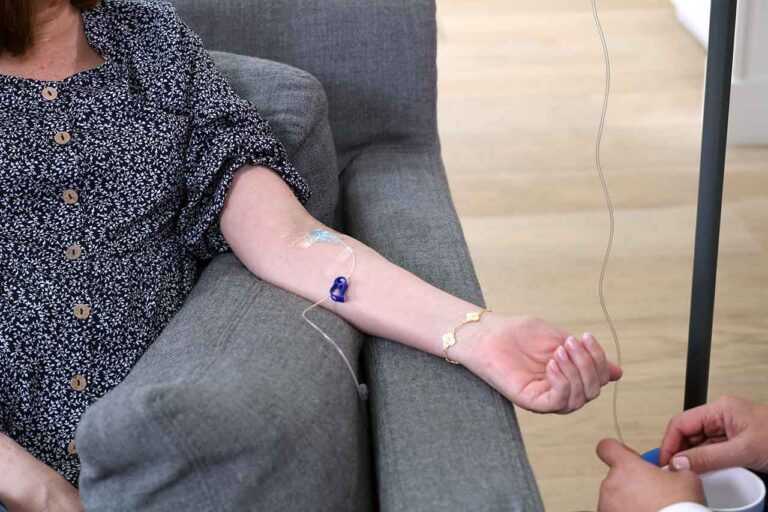
Do you experience headaches during or after IVIG infusions? If so, you are not alone. IVIG infusions can cause painful and long-lasting headaches in some individuals.
Why does IVIG cause headaches?
This article will provide an explanation for headaches caused by IVIG as well as advice on how to prevent or alleviate an IVIG headache based on actual patient experiences. Keep reading to learn how to manage your headaches.
Get Your IVIG Dose
At-Home InfusionUnderstanding the Side Effects of IVIG
Frequently, an immediate reaction to IVIG is observed. Headaches, nausea, myalgia, fever, and chills are the most common adverse reactions, and they often occur immediately, during, or after the infusion.
Less common and more severe reactions, such as post-IVIG migraine headaches and aseptic meningitis, may be delayed and the probability can increase over time. Patients who have or recently had a bacterial infection or underlying chronic inflammation are more likely to experience these adverse reactions.
According to a survey by the Immune Deficiency Foundation, 34% of reactions occurred during the initial IVIG infusion and decreased with subsequent infusions. Although rare, severe events can include hemolysis, renal impairment, and thrombotic events.
Among the most common adverse effects up to 24 hours after an IVIG infusion are headaches, which can occur for a variety of reasons.
Why Does IVIG Cause Headaches?
IVIG can induce headaches in some individuals due to its effects on the immune system. One primary mechanism involves stimulating the release of pro-inflammatory cytokines. These cytokines are signaling molecules that can induce inflammation and immune responses.
Increased cytokine activity can lead to inflammation of blood vessels and tissues in the brain, resulting in headaches. This inflammatory response is more pronounced in those with pre-existing conditions, as their immune systems may react more strongly to introducing antibodies.
Another contributing factor to IVIG headaches is hydration status. IVIG requires adequate hydration for the medication to be effectively distributed and absorbed. Infusion can lead to fluid shifts within the body, exacerbating dehydration.
Insufficient fluid levels increase the risk of headaches, causing electrolyte imbalances and affecting blood viscosity. Fluctuations in blood volume and pressure may further contribute to the sensation of headaches.
Identifying IVIG Headaches vs. Other Headache Types

Distinguishing an IVIG headache from other headaches can help you pinpoint appropriate treatment strategies. Here is a closer look at the symptoms, onset timing, and triggers of the most common types of headaches.
IVIG Headaches
Symptoms: These headaches typically present as pressure or throbbing around the forehead or temples, although they may occur anywhere on the head. Patients may also experience symptoms like nausea, sensitivity to light, and dizziness.
Onset Timing: These headaches usually occur within 24 hours after IVIG infusions. Some individuals may experience them shortly after the infusion starts or while the infusion is running.
Triggers: The main trigger is the infusion itself. Stress and dehydration before the process can also exacerbate these headaches.
Migraines
Symptoms: Migraines are characterized by intense pulsating or throbbing pain, often on one side of the head. Common accompanying symptoms include nausea, vomiting, and sensitivity to light and sound.
Onset Timing: Migraines can develop gradually or suddenly, often following specific triggers. They may last from a few hours to several days.
Triggers: Unlike IVIG headaches, migraines can occur due to hormonal changes, certain foods, stress, and changes in sleep patterns.
Tension Headaches
Symptoms: Tension headaches manifest as a dull, aching sensation across the forehead or the back of the head and neck. Pain and tenderness in the shoulder and neck muscles are also common. Tension headaches do not typically include nausea or vomiting, but sensitivity to light and sound is possible.
Onset Timing: They can develop gradually and persist for several hours or even days.
Triggers: Triggers for tension headaches often include stress, anxiety, poor posture, or muscle tension in the neck and shoulders.
Cluster Headaches
Symptoms: Cluster headaches are excruciatingly painful, often described as a sharp or burning sensation around one eye or temple. Unlike IVIG headaches, they are often accompanied by nasal congestion, a droopy eyelid, or tearing.
Onset Timing: These headaches can strike suddenly and occur in clusters over several weeks, followed by remission periods.
Triggers: Alcohol consumption, smoking, and changes in sleep patterns can trigger these types of headaches.
By recognizing these differences and understanding the type of headache you experience, you can ensure appropriate and timely intervention.
Preventing IVIG Headaches
To effectively prevent an IVIG headache, you must take proactive measures before treatment. Here are some strategies for headache prevention during and after your infusions.
Hydration Before and After IVIG
Hydration is crucial when undergoing IVIG therapy. To prevent headaches, it is important to start drinking water the day before your IVIG infusion and continue this throughout the day after the treatment.
Incorporating electrolyte-rich beverages, like coconut water or sports drinks, can further enhance hydration by replenishing essential minerals. Avoid alcohol, caffeinated or sugary drinks, as they can contribute to dehydration and exacerbate infusion-related side effects.
Additionally, eating water-rich fruits and vegetables, such as cucumbers or watermelon, supports hydration while providing beneficial nutrients. Staying consistent with these habits ensures a smoother infusion experience and minimizes the likelihood of headaches.
IV Fluid Addition
The addition of intravenous (IV) fluids on the day of your IVIG infusion is another method for obtaining additional hydration and avoiding a headache.
Some patients receive a bag of fluids before the infusion, while others get them after, or even both before and after the procedure.
Premedications
Before an infusion, Benadryl is frequently administered as an IVIG premedication by the infusion nurse or taken by the patient at home. However, Benadryl, an antihistamine available without a prescription, is not effective for everyone.
Can IVIG help?
Free IVIG Treatment InfoIf you continue to experience IVIG headaches, discuss with your doctor the possibility of switching from Benadryl to cyproheptadine (also known as Periactin). Cyproheptadine is a serotonin receptor antagonist and antihistamine that is particularly effective for plasma and blood reactions.
Pretreatment with nonsteroidal anti-inflammatory drugs (NSAIDs), acetaminophen (15 mg/kg/dose), and a nonsedating antihistamine (such as Cetirizine 10 mg) one hour before the infusion may help prevent adverse reactions. Hydrocortisone (6 mg/kg/dose, with a maximum of 100 mg) may also be considered.
Switching IVIG Preparations
Switching to a 5% IVIG preparation is often highly effective if the symptoms of IVIG headaches reappear. Caution is advised when switching IVIG products because 15% to 18% of patients experience serious adverse reactions during the process.
Switching to SCIG
The majority of physicians favor subcutaneous immunoglobulin (SCIG) over IVIG for most patients who experience a headache and may encourage making a transition.
Transitioning to SCIG reduces the risk and severity of common and more serious side effects. Therefore, transitioning to SCIG is an option for patients who experience severe headaches.
Treating IVIG Headaches
If you do experience a headache after IVIG, knowing how to treat it can make a significant difference in your comfort. There are effective treatments that can alleviate pain and allow you to continue with your daily activities.
Some treatment options include:
Over-the-Counter (OTC) Painkillers
For those experiencing headaches after infusions, over-the-counter (OTC) painkillers can be an effective way to alleviate discomfort. These medications work by blocking pain signals and reducing inflammation.
Here are some painkillers you might consider taking:
- Acetaminophen (Tylenol)
- Ibuprofen (Advil, Motrin)
- Naproxen sodium (Aleve)
- Aspirin (if not contraindicated)
Always consult your healthcare provider before starting any medication to ensure it’s safe and appropriate.
Resting in a Dark Room
Resting in a quiet, dark room can be incredibly beneficial for managing IVIG headaches. Bright lights and loud noises can worsen your discomfort. Reducing exposure to these stimuli can promote relaxation and alleviate headache intensity.
To create the ideal resting environment:
- Go to a quiet, dark room, free from distractions.
- Use blackout curtains or an eye mask to block out light.
- Consider using earplugs or white noise machines to minimize sound disturbances.
- Lie down in a comfortable position and allow your body to unwind.
Cold Compress
A cold compress is a simple yet effective method for soothing the throbbing sensation of an IVIG headache. The cold temperature helps constrict blood vessels, reducing inflammation and numbing the pain.
To use a cold compress for IVIG headaches:
- Wrap ice cubes or a cold pack in a thin cloth or towel.
- Apply it gently to your forehead or the back of your neck for 15 to 20 minutes.
- Repeat this process as needed, allowing for breaks in between to prevent skin irritation.
When to Seek Medical Attention

It’s crucial to contact your healthcare provider if your headaches:
- Worsen over time
- Persist despite treatment
- Are accompanied by severe symptoms such as visual disturbances, nausea, vomiting, confusion, or significant neck stiffness
Prompt evaluation can help identify any underlying complications that may require immediate attention.
Manage IVIG Headaches With AmeriPharma® Specialty Pharmacy
Experiencing headaches after IVIG is an unfortunate side effect of the infusions. However, understanding the causes of an IVIG headache and implementing effective prevention and treatment strategies can help you find relief and better navigate your therapy.
AmeriPharma® Specialty Pharmacy is here to support you through your journey. Our ACHC-accredited specialty pharmacy will provide at-home IVIG infusions and help you manage side effects.
Contact us today to get started and receive home IVIG treatment with full-service coordination, copay assistance, and 24/7/365 support.
If you continue to experience IVIG headaches, reach out to your healthcare provider to explore tailored solutions that cater to your individual needs.
REFERENCES:
- Tcheurekdjian H, Martin J, Kobayashi R, Wasserman R, Hostoffer R. Intrainfusion and postinfusion adverse events related to intravenous immunoglobulin therapy in immunodeficiency states. Allergy Asthma Proc. 2006 Nov-Dec;27(6):532-6. doi: 10.2500/aap.2006.27.2917. PMID: 17176791.
- Yong PL, Boyle J, Ballow M, Boyle M, Berger M, Bleesing J, Bonilla FA, Chinen J, Cunninghamm-Rundles C, Fuleihan R, Nelson L, Wasserman RL, Williams KC, Orange JS. Use of intravenous immunoglobulin and adjunctive therapies in the treatment of primary immunodeficiencies: A working group report of and study by the Primary Immunodeficiency Committee of the American Academy of Allergy Asthma and Immunology. Clin Immunol. 2010 May;135(2):255-63. doi: 10.1016/j.clim.2009.10.003. Epub 2009 Nov 14. PMID: 19914873.
- Perez EE, Orange JS, Bonilla F, Chinen J, Chinn IK, Dorsey M, El-Gamal Y, Harville TO, Hossny E, Mazer B, Nelson R, Secord E, Jordan SC, Stiehm ER, Vo AA, Ballow M. Update on the use of immunoglobulin in human disease: A review of evidence. J Allergy Clin Immunol. 2017 Mar;139(3S):S1-S46. doi: 10.1016/j.jaci.2016.09.023. Epub 2016 Dec 29. PMID: 28041678.
- Ameratunga R, Sinclair J, Kolbe J. Increased risk of adverse events when changing intravenous immunoglobulin preparations. Clin Exp Immunol. 2004 Apr;136(1):111-3. doi: 10.1111/j.1365-2249.2004.02412.x. PMID: 15030521; PMCID: PMC1809000.













